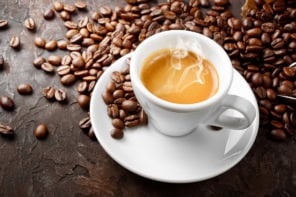
Inspired by a conifer leaf, researchers at City University of Hong Kong have developed an artificial surface that causes different liquids to flow in different directions, depending on their surface tension. The team, led by Zuankai Wang, based their design on Araucaria leaves, which feature periodic arrangements of tilted structures that resemble the teeth of a ratchet. Their discovery could lead to the development of systems that intelligently guide liquids to precise targets.
When a liquid is deposited onto a surface, it should always move along directions that will reduce its overall surface energy. Normally, these directions are determined by the properties of the surface, not the properties of the liquid.
Theme park visit
When team member Shile Feng visited a theme park in Hong Kong, he became fascinated with the leaves of Araucaria, which is a genus of conifer trees widely found in gardens. He realized that liquids of different surface tension should move in different directions along the leaves.
Araucaria leaves are made up of periodically arranged, millimetre-sized, pointed structures, which Wang and colleagues refer to as ratchets (see figure). Each ratchet tilts towards the tip of the leaf. While the upper surfaces of these ratchets are relatively flat, the lower surfaces are curved, both in the transverse and longitudinal directions.
Without the ratchets, a liquid droplet placed onto a needle-shaped leaf would minimize its energy by moving towards the tip. The team found that that if a liquid with high surface tension (such as water) is placed onto an Araucaria leaf, capillary action – whereby a combination of surface tension and adhesion draws certain liquids through narrow spaces – causes the liquid to move away from the tip.
The researchers found that water droplets became pinned at the tips of single ratchets. Due to capillary action, the droplets then travel through the space between an adjacent ratchet, against the direction of the ratchet tilt. When they repeated the experiment using droplets of ethanol – which has a far lower surface tension than water – the team found that capillary action did not occur, and the liquid instead moved along the ratchet tilting direction towards the tip of the leaves.
Printed polymer
To further study this effect, the team created “Araucaria leaf-inspired surfaces” (ALISs), using a 3D-printed polymer to make surfaces covered in ratchets (see figure). Across several different designs, they varied factors including the sizes, curvatures, and tilting angles of the artificial ratchets, as well as the spacings between their pointed tips.

Condensing droplets get a boost from micron-thin polymer coating
The team showed that the directions and speeds of liquid transport across the ALISs could be adjusted, using different mixtures of water and ethanol. When a droplet contained less than 10% ethanol, it continued to move away from the ratchet-tilting direction; but a droplet with over 40% ethanol, moved towards it. In between these concentrations, the mixture moved in both directions at the same time.
With further improvements, the researchers say that ALIS systems could achieve the intelligent, long-distance transport of liquids to target destinations. This could present new opportunities for applications including microfluidics, heat transfer, and the smart sorting of liquids.
The surface is described in Science.



